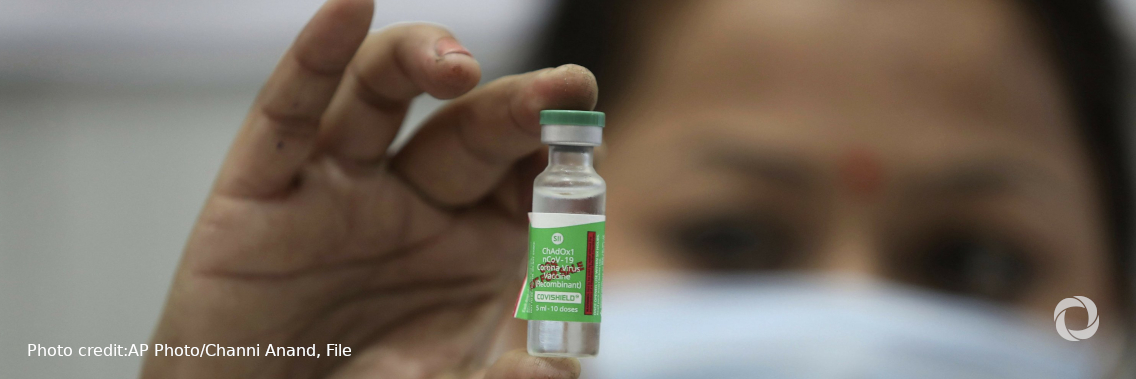Today, the Government of India provided one million doses of the Covishield vaccine to Nepal. Manufactured by the Serum Institute of India, the vaccines were handed over to Nepal during an event organized at Tribhuwan International Airport (TIA) in Kathmandu this afternoon. The request for the supply of the Indian manufactured COVID-19 vaccines was made during a recent visit by the Foreign Minister of Nepal to India.
The vaccines arrived at TIA from Mumbai via an Air India flight and Vinay Mohan Kwatra, Indian Ambassador to Nepal, handed over the vaccines to Hridayesh Tripathi, Health Minister of Nepal at the airport. The vaccines were then taken directly to the Department of Health Services’ (DHS) Vaccine Storage Center for storage.

Provided by India in the form of a grant, the vaccines arrived the day after the announcement was made through a joint press conference held by the Ministry of Health and Population (MoHP) of Nepal and the Indian Embassy in Nepal.
Receiving the vaccines, Minister Tripathi thanked India for its support and said, “While these vaccines will be given to frontline workers in the first phase, we will soon procure vaccines for other citizens of Nepal.” Announcing that India has commenced vaccinations against the coronavirus on January 16, Vinay Mohan Kwatra said, “Providing the vaccine to Nepal less than a week after vaccination began in India is a unique example of the friendship between the two countries.”

Laxman Aryal, Secretary at the MoHP, said that all the vaccines would be stored in the central storage center to maintain the cold chain and distributed to all provinces as per their requirements.

According to Jhalak Gautam, Chief of Vaccine Unit at the DHS, these vaccines are not available to pregnant women, breastfeeding mothers, patients suffering from chronic disease, and those who are currently undergoing treatment.
- In the first phase, the vaccines bought from India will be given to the health workers, cleaners, and ambulance drivers engaged in the frontline battle against COVID-19 in Nepal with all arrangements having been made to achieve this.
- Although the government of Nepal plans to vaccinate 72% of Nepal’s total population who are above the age of 15, the vaccines provided by India will be given to 500,000 frontline workers above the age of 18.
- Currently, there are a total of 300,000 health workers including 52,000 women health volunteers across the country.
- As one of the largest manufacturers of vaccines, India began to provide coronavirus vaccines to neighboring countries on January 20 when it sent supplies to Bhutan and the Maldives followed by Nepal and Bangladesh on January 21. Vaccines will be provided to Myanmar and Seychelles on January 22.
- On January 15, the Department of Drug Administration (DDA) of Nepal sanctioned the Covishield vaccine for emergency use against COVID-19 in Nepal.
In November last year, the Government of Nepal, through an ordinance, amended the Drugs Act (1978) to facilitate the supply of vaccines in connection with COVID-19, and the procurement, supply, and distribution of medicines are carried out as per this Act.
The Drugs (Third Amendment) Ordinance, 2020 incorporated the following provisions in relation to the emergency use of a medicine or vaccine:
- Drugs or vaccines registered with the World Health Organization or registered by the country’s drug regulatory body approved by the relevant body for emergency use will be registered by the DDA for emergency use in Nepal on the recommendation of the Drug Advisory Committee.
- The DDA will make recommendations in accordance with this Act to issue licenses as per the prevailing law for the import of registered drugs or vaccines.
- While granting the letter of recommendation, the DDA may specify the quantity to be imported or the necessary conditions regarding the use, packaging, or distribution of such drugs or vaccines.
- The DDA may revoke the registration of such drugs or vaccines if it is deemed necessary to prohibit their use due to the effect of imported or used, sold, or distributed drugs or vaccines.
Meantime, it has been confirmed that 336 more people in Nepal have been infected by COVID-19 in and four more people have died of the virus across the country in the last 24 hours. With this, the total number of those infected in Nepal has now reached 268,646. Whilst the recovery rate is 97.9%, the number of deaths in Nepal due to the coronavirus has reached 1979 and there are currently 3,799 active infections across the country.

